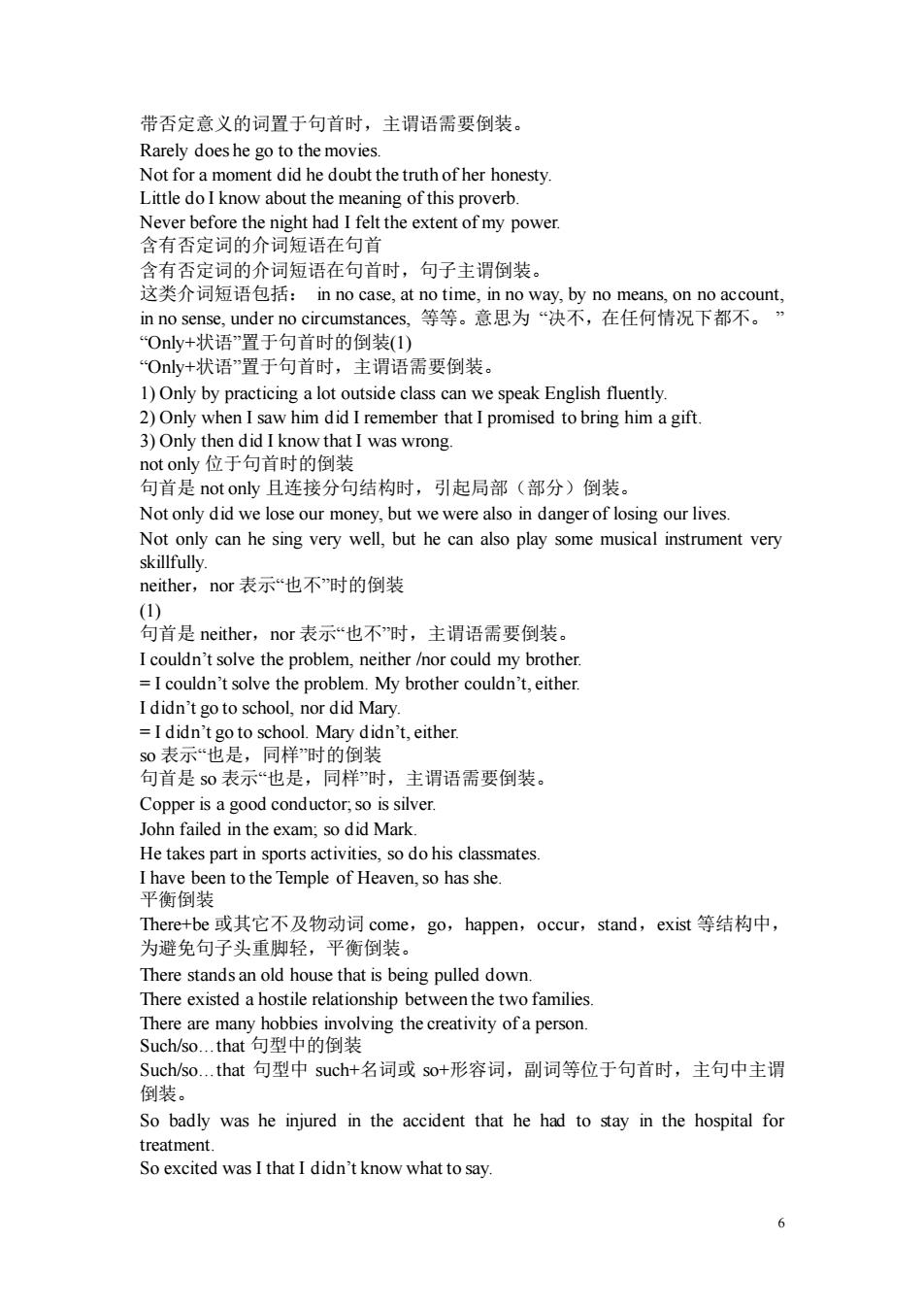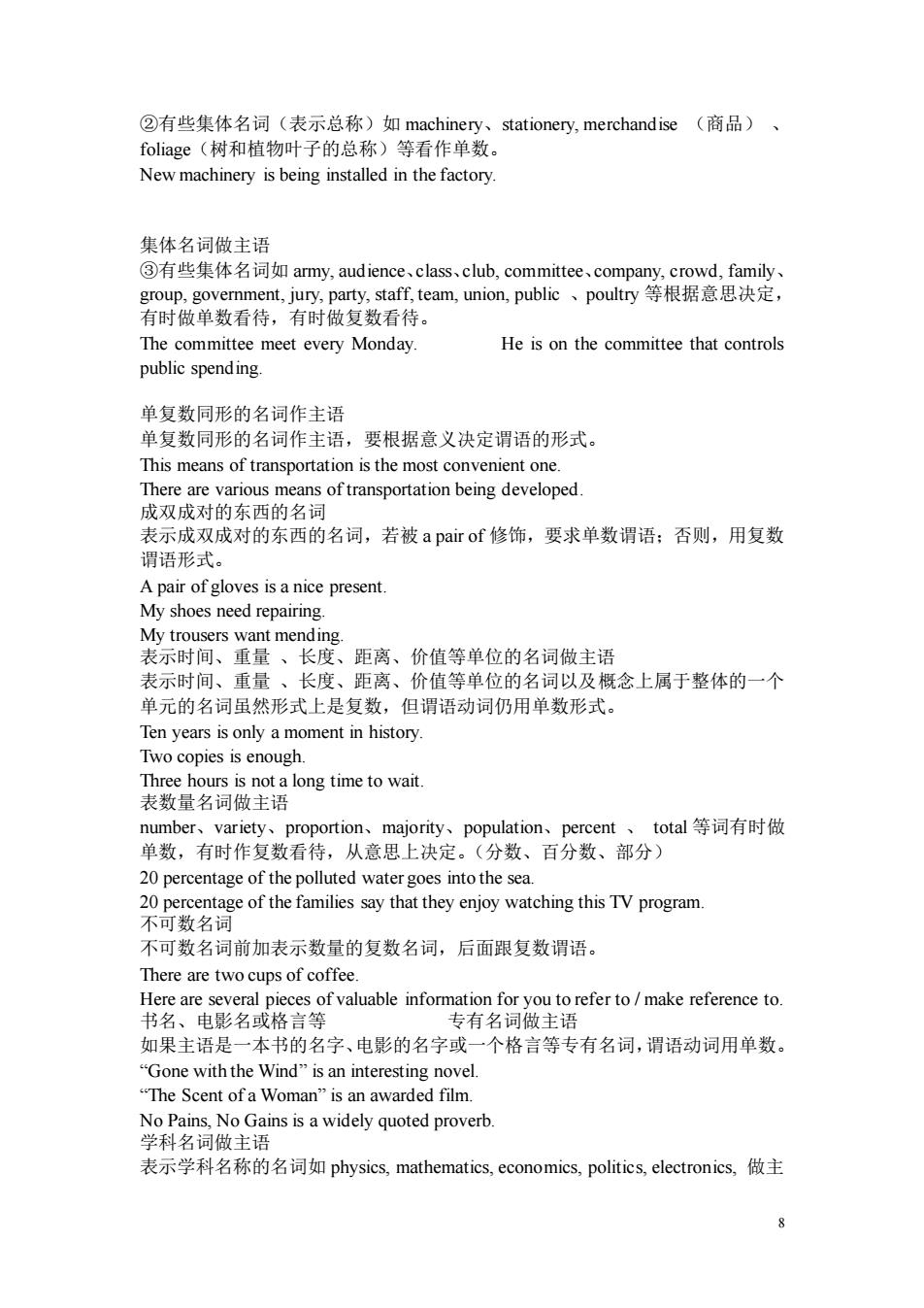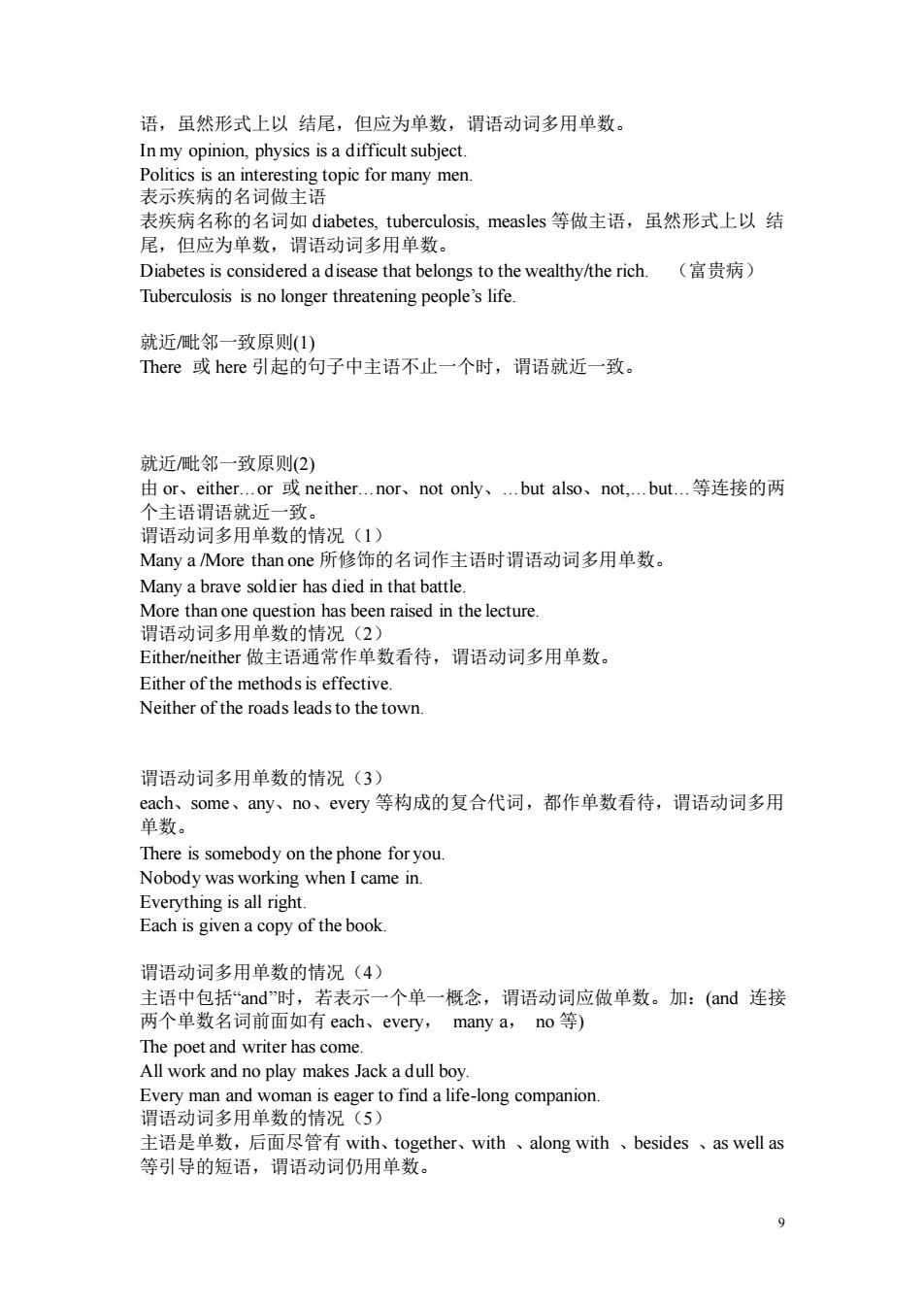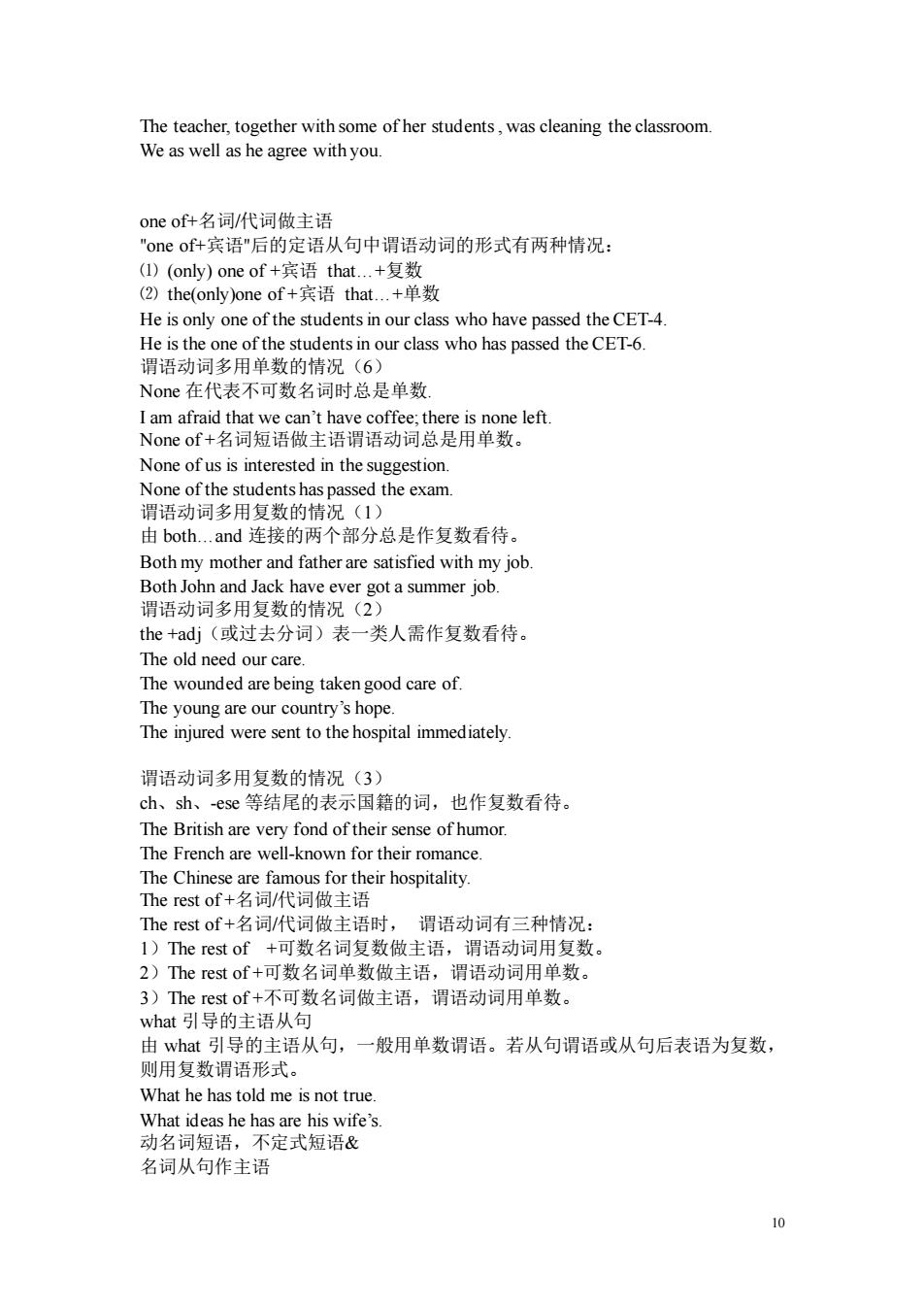
带否定意义的词置于句首时,主谓语需要倒装。Rarely does he go to the movies.Not for a moment did he doubt the truth of her honesty.Little doI know about the meaning of this proverbNever before the night had Ifelt the extent ofmy power.含有否定词的介词短语在句首含有否定词的介词短语在句首时,句子主谓倒装。这类介词短语包括:innocase,atnotime,innoway,bynomeans,onnoaccountinnosense,undernocircumstances,等等。意思为“决不,在任何情况下都不。“Only+状语"置于句首时的倒装(1)“Only+状语”置于句首时,主谓语需要倒装。1)Only by practicing a lot outside class can we speak English fluently.2) Only when I saw him did I remember that I promised to bring him a gift.3) Only then did I know that I was wrong.notonly位于句首时的倒装句首是notonly且连接分句结构时,引起局部(部分)倒装。Notonly did welose our money,but we were also in dangerof losing our livesNot only can he sing very well, but he can also play some musical instrument veryskillfully.neither,nor表示“也不"时的倒装(1)句首是neither,nor表示“也不"时,主谓语需要倒装。Icouldn'tsolvetheproblem,neither/norcouldmybrother=Icouldn't solve theproblem.Mybrother couldn't, eitherI didn't go to school, nor did Mary.= I didn't go to school Mary didn't. eitherSo表示“也是,同样"时的倒装句首是So表示“也是,同样"时,主谓语需要倒装。Copper is a good conductor, so is silver.John failed in the exam, so did MarkHe takes part in sports activities, so do his classmates.I havebeentotheTempleof Heaven,sohasshe平衡倒装There+be或其它不及物动词come,go,happen,occur,stand,exist等结构中,为避免句子头重脚轻,平衡倒装。There stands an old house that is being pulled downThere existed a hostile relationship between the two families.TherearemanyhobbiesinvolvingthecreativityofapersonSuch/so..that句型中的倒装Such/so...that句型中such+名词或so+形容词,副词等位于句首时,主句中主谓倒装。So badly was he injured in the accident that he had to stay in the hospital fortreatment.So excited was I that I didn't know what to say6
6 带否定意义的词置于句首时,主谓语需要倒装。 Rarely does he go to the movies. Not for a moment did he doubt the truth of her honesty. Little do I know about the meaning of this proverb. Never before the night had I felt the extent of my power. 含有否定词的介词短语在句首 含有否定词的介词短语在句首时,句子主谓倒装。 这类介词短语包括: in no case, at no time, in no way, by no means, on no account, in no sense, under no circumstances, 等等。意思为 “决不,在任何情况下都不。 ” “Only+状语”置于句首时的倒装(1) “Only+状语”置于句首时,主谓语需要倒装。 1) Only by practicing a lot outside class can we speak English fluently. 2) Only when I saw him did I remember that I promised to bring him a gift. 3) Only then did I know that I was wrong. not only 位于句首时的倒装 句首是 not only 且连接分句结构时,引起局部(部分)倒装。 Not only did we lose our money, but we were also in danger of losing our lives. Not only can he sing very well, but he can also play some musical instrument very skillfully. neither,nor 表示“也不”时的倒装 (1) 句首是 neither,nor 表示“也不”时,主谓语需要倒装。 I couldn’t solve the problem, neither /nor could my brother. = I couldn’t solve the problem. My brother couldn’t, either. I didn’t go to school, nor did Mary. = I didn’t go to school. Mary didn’t, either. so 表示“也是,同样”时的倒装 句首是 so 表示“也是,同样”时,主谓语需要倒装。 Copper is a good conductor; so is silver. John failed in the exam; so did Mark. He takes part in sports activities, so do his classmates. I have been to the Temple of Heaven, so has she. 平衡倒装 There+be 或其它不及物动词 come,go,happen,occur,stand,exist 等结构中, 为避免句子头重脚轻,平衡倒装。 There stands an old house that is being pulled down. There existed a hostile relationship between the two families. There are many hobbies involving the creativity of a person. Such/so.that 句型中的倒装 Such/so.that 句型中 such+名词或 so+形容词,副词等位于句首时,主句中主谓 倒装。 So badly was he injured in the accident that he had to stay in the hospital for treatment. So excited was I that I didn’t know what to say

比较状语从句中的倒装than引导的比较状语从句中,主从句谓语趋向中间以达到平衡,此时从句要求主谓倒装。Nowadays, with the rapid development of science and technology, man is less limitedbynaturethanwerehisforefathers/ancestors表频率的状语至于句首倒装表频率的状语至于句首,倒装。Many a time has he given us sound adviceTwice a week does he go to visit his grandparents.More than once havewe heard him make such promisesAs,though让步状语从句中倒装在以as,though引导的让步状语从句中,从句常用倒装语序,把表语或状语提前。(名,形,付,动词)Child that he is, he can distinguish between right and wrong.Intelligent as/though you are, you should be modest.Much as I admire him, I don't think he is perfect.Try as she did, she failed again.虚拟语气中的倒装虚拟语气中省略"if"或“whether"时的倒装。Wereitlefttometochoose,Ipreferthelattertotheformer.Had it not rained so heavily, we would have visited the Summer Palace yesterdayBe we rich or poor, we should have our own dignity副词至于句首Here、there、in、out、up、down等表示方位的副词至于句首时,主谓需要倒装。Here comes thebus.Down jumped the little boy from the bridgeHere it(指thebus)comesThere they went.Subject&VerbAgreement主谓一致集体名词做主语集体名词做主语时,谓语动词情况有三种①有些集体名词如cattle、folk、people、youth、clergy(教士)、police等常做复数看。The police have caught themurderer集体名词做主语2
7 比较状语从句中的倒装 than 引导的比较状语从句中,主从句谓语趋向中间以达到平衡,此时从句要求主 谓倒装。 Nowadays, with the rapid development of science and technology, man is less limited by nature than were his forefathers/ancestors. 表频率的状语至于句首倒装 表频率的状语至于句首,倒装。 Many a time has he given us sound advice. Twice a week does he go to visit his grandparents. More than once have we heard him make such promises. As,though 让步状语从句中倒装 在以 as,though 引导的让步状语从句中,从句常用倒装语序,把表语或状语提 前。(名,形,付, 动词) Child that he is, he can distinguish between right and wrong. Intelligent as/though you are, you should be modest. Much as I admire him, I don’t think he is perfect. Try as she did, she failed again. 虚拟语气中的倒装 虚拟语气中省略“if”或“whether”时的倒装。 Were it left to me to choose, I prefer the latter to the former. Had it not rained so heavily, we would have visited the Summer Palace yesterday. Be we rich or poor, we should have our own dignity. 副词至于句首 Here、there、in、out、up、down 等表示方位的副词至于句首时,主谓需要倒装。 Here comes the bus. Down jumped the little boy from the bridge. Here it ( 指 the bus) comes. There they went. Subject & Verb Agreement 主谓一致 集体名词做主语 集体名词做主语时,谓语动词情况有三种 ①有些集体名词如 cattle、folk 、people 、youth 、clergy(教士)、police 等常 做复数看。 The police have caught the murderer. 集体名词做主语

②有些集体名词(表示总称)如machinery、stationery,merchandise(商品)foliage(树和植物叶子的总称)等看作单数。New machinery is being installed in thefactory集体名词做主语③有些集体名词如army,audience、class、club,committee、company,crowd,familygroup,governmentjury,partystaff,team,union,publicpoultry等根据意思决定,有时做单数看待,有时做复数看待。The committee meet every MondayHeisonthecommitteethatcontrolspublic spend ing单复数同形的名词作主语单复数同形的名词作主语,要根据意义决定谓语的形式。This means of transportation is the most convenient one.Therearevariousmeans oftransportationbeingdeveloped成双成对的东西的名词表示成双成对的东西的名词,若被apairof修饰,要求单数谓语;否则,用复数谓语形式。A pair of gloves is a nice presentMy shoes need repairing.Mytrouserswantmending表示时间、重量、长度、距离、价值等单位的名词做主语表示时间、重量、长度、距离、价值等单位的名词以及概念上属于整体的一个单元的名词虽然形式上是复数,但谓语动词仍用单数形式。Ten years is only a moment in history.Two copies is enough.Three hours is not a long timeto wait.表数量名词做主语number、variety、proportion、majority、population、percent、total等词有时做单数,有时作复数看待,从意思上决定。(分数、百分数、部分)20 percentage of the polluted water goes into the sea20percentageofthefamiliessaythattheyenjoywatchingthisTVprogram.不可数名词不可数名词前加表示数量的复数名词,后面跟复数谓语。There are two cups of coffee.Here are several pieces of valuable information for you to refer to /make reference to.书名、电影名或格言等专有名词做主语如果主语是一本书的名字、电影的名字或一个格言等专有名词,谓语动词用单数。"Gone with the Wind” is an interesting novel“TheScentofaWomanisanawardedfilmNoPains,NoGains is awidelyquoted proverb学科名词做主语表示学科名称的名词如physics,mathematics,economics,politics,electronics,做主8
8 ②有些集体名词(表示总称)如 machinery、stationery, merchandise (商品) 、 foliage(树和植物叶子的总称)等看作单数。 New machinery is being installed in the factory. 集体名词做主语 ③有些集体名词如 army, audience、class、club, committee、company, crowd, family、 group, government, jury, party, staff, team, union, public 、poultry 等根据意思决定, 有时做单数看待,有时做复数看待。 The committee meet every Monday. He is on the committee that controls public spending. 单复数同形的名词作主语 单复数同形的名词作主语,要根据意义决定谓语的形式。 This means of transportation is the most convenient one. There are various means of transportation being developed. 成双成对的东西的名词 表示成双成对的东西的名词,若被 a pair of 修饰,要求单数谓语;否则,用复数 谓语形式。 A pair of gloves is a nice present. My shoes need repairing. My trousers want mending. 表示时间、重量 、长度、距离、价值等单位的名词做主语 表示时间、重量 、长度、距离、价值等单位的名词以及概念上属于整体的一个 单元的名词虽然形式上是复数,但谓语动词仍用单数形式。 Ten years is only a moment in history. Two copies is enough. Three hours is not a long time to wait. 表数量名词做主语 number、variety、proportion、majority、population、percent 、 total 等词有时做 单数,有时作复数看待,从意思上决定。(分数、百分数、部分) 20 percentage of the polluted water goes into the sea. 20 percentage of the families say that they enjoy watching this TV program. 不可数名词 不可数名词前加表示数量的复数名词,后面跟复数谓语。 There are two cups of coffee. Here are several pieces of valuable information for you to refer to / make reference to. 书名、电影名或格言等 专有名词做主语 如果主语是一本书的名字、电影的名字或一个格言等专有名词,谓语动词用单数。 “Gone with the Wind” is an interesting novel. “The Scent of a Woman” is an awarded film. No Pains, No Gains is a widely quoted proverb. 学科名词做主语 表示学科名称的名词如 physics, mathematics, economics, politics, electronics, 做主

语,虽然形式上以结尾,但应为单数,谓语动词多用单数。In my opinion, physics is a difficult subject.Politics is an interesting topic formany men表示疾病的名词做主语表疾病名称的名词如diabetes,tuberculosis,measles等做主语,虽然形式上以结尾,但应为单数,谓语动词多用单数。(富贵病)Diabetes is considered adisease that belongs to the wealthy/the rich.Tuberculosis is no longerthreatening people's life.就近/毗邻一致原则(1)There或here引起的句子中主语不止一个时,谓语就近一致。就近/毗邻一致原则(2)由or、either...or或neither...nor、notonly、...butalso、not...but...等连接的两个主语谓语就近一致。谓语动词多用单数的情况(1)Manya/Morethanone所修饰的名词作主语时谓语动词多用单数。Manyabravesoldierhasdied inthatbattleMore than one question has been raised in the lecture谓语动词多用单数的情况(2)Either/neither做主语通常作单数看待,谓语动词多用单数。EitherofthemethodsiseffectiveNeither of theroadsleadstothetown谓语动词多用单数的情况(3)each、some、any、no、every等构成的复合代词,都作单数看待,谓语动词多用单数。There is somebody on the phone for youNobody was working when I came inEverything is all right.Each is given a copy of the book谓语动词多用单数的情况(4)主语中包括“and"时,若表示一个单一概念,谓语动词应做单数。加:(and连接两个单数名词前面如有each、every,manya,no等)The poet and writer has come.All work and no play makes Jack a dull boy.Everyman andwoman is eagertofinda life-long companion谓语动词多用单数的情况(5)主语是单数,后面尽管有with、together、with、alongwith、besides、aswellas等引导的短语,谓语动词仍用单数。9
9 语,虽然形式上以 结尾,但应为单数,谓语动词多用单数。 In my opinion, physics is a difficult subject. Politics is an interesting topic for many men. 表示疾病的名词做主语 表疾病名称的名词如 diabetes, tuberculosis, measles 等做主语,虽然形式上以 结 尾,但应为单数,谓语动词多用单数。 Diabetes is considered a disease that belongs to the wealthy/the rich. (富贵病) Tuberculosis is no longer threatening people’s life. 就近/毗邻一致原则(1) There 或 here 引起的句子中主语不止一个时,谓语就近一致。 就近/毗邻一致原则(2) 由 or、either.or 或 neither.nor、not only、.but also、not,.but.等连接的两 个主语谓语就近一致。 谓语动词多用单数的情况(1) Many a /More than one 所修饰的名词作主语时谓语动词多用单数。 Many a brave soldier has died in that battle. More than one question has been raised in the lecture. 谓语动词多用单数的情况(2) Either/neither 做主语通常作单数看待,谓语动词多用单数。 Either of the methods is effective. Neither of the roads leads to the town. 谓语动词多用单数的情况(3) each、some、any、no、every 等构成的复合代词,都作单数看待,谓语动词多用 单数。 There is somebody on the phone for you. Nobody was working when I came in. Everything is all right. Each is given a copy of the book. 谓语动词多用单数的情况(4) 主语中包括“and”时,若表示一个单一概念,谓语动词应做单数。加:(and 连接 两个单数名词前面如有 each、every, many a, no 等) The poet and writer has come. All work and no play makes Jack a dull boy. Every man and woman is eager to find a life-long companion. 谓语动词多用单数的情况(5) 主语是单数,后面尽管有 with、together、with 、along with 、besides 、as well as 等引导的短语,谓语动词仍用单数

The teacher, together with some of her students, was cleaning the classroomWe as well as he agree with youoneof+名词/代词做主语"oneof+宾语"后的定语从句中谓语动词的形式有两种情况(1)(only)oneof+宾语that...+复数(2)the(only)oneof+宾语that...+单数He is only one of the students in our class who have passed the CET-4.He is the one of the students in our class who has passed the CET-6.谓语动词多用单数的情况(6)None在代表不可数名词时总是单数I am afraid that we can't have coffee, there is none left.Noneof+名词短语做主语谓语动词总是用单数。None ofus is interested in the suggestionNoneofthe students has passed theexam.谓语动词多用复数的情况(1)由both...and连接的两个部分总是作复数看待。Both my mother and father are satisfied with my jobBothJohn and Jack have evergota summer job谓语动词多用复数的情况(2)the+adi(或过去分词)表一类人需作复数看待。The old need our care.The wounded are being taken good care of.The young are our country's hope.The injured were sent tothehospital immediately谓语动词多用复数的情况(3)ch、sh、-ese等结尾的表示国籍的词,也作复数看待。The British are very fond of their sense of humor.The French are well-known for their romanceThe Chinese are famous for their hospitalityTherestof+名词/代词做主语Therestof+名词/代词做主语时,谓语动词有三种情况:1)Therestof+可数名词复数做主语,谓语动词用复数。2)Therestof+可数名词单数做主语,谓语动词用单数。3)Therestof+不可数名词做主语,谓语动词用单数。what引导的主语从句由what引导的主语从句,一般用单数谓语。若从句谓语或从句后表语为复数,则用复数谓语形式。What he has told me is not trueWhat ideas he has are his wife's动名词短语,不定式短语&名词从句作主语10
10 The teacher, together with some of her students , was cleaning the classroom. We as well as he agree with you. one of+名词/代词做主语 "one of+宾语"后的定语从句中谓语动词的形式有两种情况: ⑴ (only) one of +宾语 that.+复数 ⑵ the(only)one of +宾语 that.+单数 He is only one of the students in our class who have passed the CET-4. He is the one of the students in our class who has passed the CET-6. 谓语动词多用单数的情况(6) None 在代表不可数名词时总是单数. I am afraid that we can’t have coffee; there is none left. None of +名词短语做主语谓语动词总是用单数。 None of us is interested in the suggestion. None of the students has passed the exam. 谓语动词多用复数的情况(1) 由 both.and 连接的两个部分总是作复数看待。 Both my mother and father are satisfied with my job. Both John and Jack have ever got a summer job. 谓语动词多用复数的情况(2) the +adj(或过去分词)表一类人需作复数看待。 The old need our care. The wounded are being taken good care of. The young are our country’s hope. The injured were sent to the hospital immediately. 谓语动词多用复数的情况(3) ch、sh、-ese 等结尾的表示国籍的词,也作复数看待。 The British are very fond of their sense of humor. The French are well-known for their romance. The Chinese are famous for their hospitality. The rest of +名词/代词做主语 The rest of +名词/代词做主语时, 谓语动词有三种情况: 1)The rest of +可数名词复数做主语,谓语动词用复数。 2)The rest of +可数名词单数做主语,谓语动词用单数。 3)The rest of +不可数名词做主语,谓语动词用单数。 what 引导的主语从句 由 what 引导的主语从句,一般用单数谓语。若从句谓语或从句后表语为复数, 则用复数谓语形式。 What he has told me is not true. What ideas he has are his wife’s. 动名词短语,不定式短语& 名词从句作主语